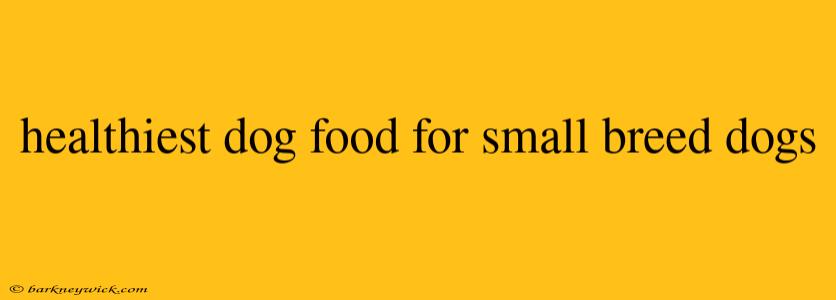Nourishing Tiny Tummies: The Healthiest Dog Food for Small Breeds
Remember that adorable chihuahua puppy, Coco? She was so tiny, I felt like I could hold her in one hand. But when it came to choosing the right food, it felt like an overwhelming task. I wanted something that was not only nutritious but also catered to her small, delicate system. This journey to find the perfect food led me down a path of learning about the unique needs of small breed dogs, and let me tell you, it's a fascinating world!
Here's the thing: in my opinion, not all dog food is created equal. While a large breed dog might be able to tolerate some lower-quality kibble, smaller breeds are much more sensitive. Their fast metabolism and smaller stomachs mean they need a higher concentration of nutrients to thrive.
Let's break down what makes a healthy diet for small breed pups:
Tailored Nutrition for Tiny Champions
Smaller dogs have unique nutritional requirements, which means their food needs to be specially formulated. These differences include:
- Higher calorie density: Small breeds burn calories quickly, so their food needs to be calorie-dense to provide enough energy.
- Increased protein content: Small breeds require more protein for muscle development and maintenance.
- Smaller kibble size: Small breeds have smaller mouths and teeth, making smaller kibble easier to eat and chew.
- Joint support: Small breeds are prone to joint issues, so foods with glucosamine and chondroitin can help maintain healthy joints.
- Digestive health: Small breeds can be prone to digestive issues, so choosing food with easily digestible ingredients is crucial.
It's important to avoid ingredients that can be harmful to small dogs:
- Artificial colors and flavors: These can be linked to health issues and are generally not necessary in dog food.
- Fillers like corn and wheat: These provide little nutritional value and can be difficult for small breeds to digest.
- Excessive amounts of fat: While fat is essential, too much can lead to obesity and other health issues.
A Guide to Choosing the Right Food
So, how can you choose the healthiest food for your little buddy? Here are some tips:
- Check the label: Look for foods specifically formulated for small breeds. The label should mention the breed size and highlight the key nutrients mentioned above.
- Read the ingredients list: Avoid ingredients that are difficult to digest, artificial, or filled with fillers.
- Consider your dog's age and activity level: Puppies need more calories and protein than adult dogs, and active dogs need more energy than sedentary dogs.
- Talk to your veterinarian: Your vet can recommend a specific food based on your dog's individual needs.
One brand that consistently receives positive reviews is "Purina Pro Plan Small Breed Formula." This kibble is designed with small breed dogs in mind, providing a blend of high-quality protein, essential nutrients, and smaller kibble size for easy chewing.
Remember, Coco thrived on a combination of high-quality kibble and small, healthy treats. She's a testament to the fact that providing the right nutrition can make a world of difference in a small dog's life.
By following these tips and choosing a food specifically formulated for small breeds, you can give your furry friend the best possible chance to live a long and healthy life. So, whether you're facing the same daunting task I did with Coco, or you're just looking to ensure your small breed gets the best nutrition, remember: choosing the right food is an investment in their health and happiness.
